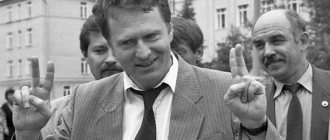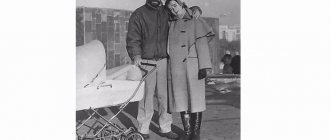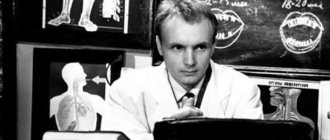It’s a rare person whose childhood was during the Soviet era who has not heard the songs of the famous Belarusian group “Pesnyary”. The artistic director of this legendary ensemble was Vladimir Mulyavin. It is he who is the author of almost all the compositions of “Pesnyary”, which can still be called hits today. But it’s not just the musician’s career that is of interest. The biography and family of Vladimir Mulyavin are topics that cannot but be touched upon when talking about the artist. During his life, the musician managed to marry three times and become the father of four children. Let's talk about this in more detail.
Personal life of Vladimir Mulyavin
Young Vladimir learned what family life was at the age of 18, when he married Lydia Karmalskaya. The girl was three years older than her chosen one and participated in the same ensemble with him. Lydia made Mulyavin a father, giving birth to two children: in 1961, daughter Marina, and in 1974, son Vladimir. But this did not save their early marriage.
Vladimir Mulyavin
For the second time, Vladimir walked down the aisle with Svetlana Slizskaya. In 1976, he became a father again: his wife gave birth to a daughter, Olga. In 1981, this marriage also broke up. Mulyavin met his next chosen one on the set of the film “Walking Through Torment.” The musician’s third wife was Svetlana Penkina. In 1982, the woman gave the main “Pesnyar” her second son, Valery. Svetlana devoted herself entirely to raising her child.
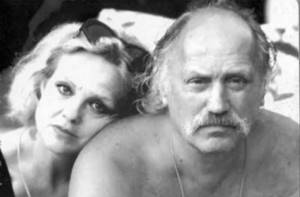
She lived in marriage with Mulyavin for more than 20 years, until the legendary musician passed away in 2003. All the children of Vladimir Mulyavin chose different paths in life. The fate of some of them was successful, and with some it played a cruel joke.
Education
Mom was only dissatisfied with his hobby, saying: “I would rather go to work. How long can you play the guitar? And Vladimir listened to her, began to work, but still with a guitar in his hands. He played on the street near entrances and in passages, in the forest near fires, and on trains.
In addition to the guitar and balalaika, the teenager also mastered a couple of string instruments. And at his so-called concerts he gave his best. Passengers and passersby liked this dedication of the young artist, and Vladimir received good rewards. The boy returned home with bags full of groceries bought with his first royalties.
In 1956, Mulyavin graduated from eight-year school and continued his studies at the Sverdlovsk Music College. He entered the string instruments department, majoring in guitar. The teachers immediately drew attention to the talented and lively guy.
Simultaneously with his studies, Mulyavin played in an orchestra of folk instruments, which was assembled from his students by Alexander Ivanovich Navrotsky. Vladimir got the part of the double bass, and he wrote the scores for himself, although the director developed them for all the other members of the orchestra.
Soon Volodya decided to take up modern music; he was very interested in jazz. He created a group with the guys from the school, but the heads of the school expelled the guys for “imitation of Western music.”
Then Vladimir and his brother went to the neighboring Chelyabinsk region and attempted to enter the Magnitogorsk music school, but failed the literature exam. Returning to Sverdlovsk, he learned that he had been reinstated at the school, the first mentor Navrotsky interceded. But after two months, Volodya lost all desire to study, and he himself took the documents from the educational institution.
The first family of Vladimir Mulyavin: wife Lydia Karmalskaya, daughter Marina and son Vladimir
Young Vladimir and Lydia did not throw a lavish wedding, they simply got married in Kaliningrad. In those years, Karmalskaya was already a sought-after artist; she performed in an original genre - artistic whistling.
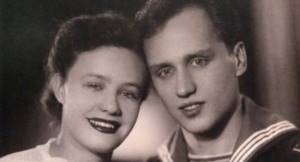
Vladimir Mulyavin's first wife Lidiya Karmalskaya
Vladimir Mulyavin's first wife helped him become a soloist of the ensemble. When the couple divorced in 1975, the musician was already an Honored Artist of Belarus and had numerous victories in various competitions under his belt.
“As a true woman, who loves a man and knows his worth, began to engage in his development. With persuasion and persuasion, “carrot and stick,” she forced him to study. Do not be surprised! At that time he was not an adult. Mulyavin got married at the age of 18,” the musician’s eldest daughter shared the details.
Mulyavin felt a craving for the opposite sex, and therefore periodically cheated on his wife. Lydia forgave everything and tried to save the marriage. She even decided to give Vladimir the long-awaited heir, although she was forbidden to give birth. When little Volodya was born, Mulyavin filed for divorce. After the separation, the former spouses were able to maintain friendly relations.
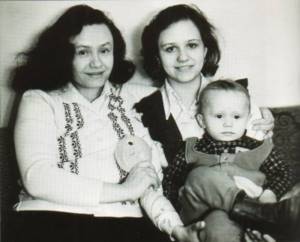
Lydia with mother and child
Karmalskaya never married again; she could not find a worthy replacement for Mulyavin. The woman devoted herself entirely to raising her son. At the time of the divorce, Lydia’s eldest daughter was already 15 years old.

Mulyavin's first wife and his son
Vladimir Mulyavin Jr. followed in his father’s footsteps; he was a musician with great promise. The head of Pesnyary was very proud of his heir. But the famous surname did not help Vladimir achieve creative heights, but, on the contrary, became a stigma. Mulyavin's eldest son was forced to leave the Pesnyary ensemble, whose new leader was Vyacheslav Sharapov. The young man had a hard time leaving, not understanding why he was kicked out.
In 2006, the son of Vladimir Mulyavin died in prison from a drug overdose.
The musician’s eldest daughter, Marina, published a book of memoirs 15 years after her father’s death.
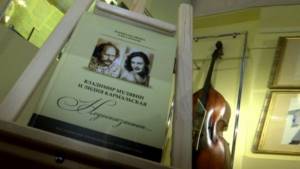
Book by Mulyavin's daughter
In it, the woman admitted that Vladimir regretted divorcing Karmalskaya. The third wife, Svetlana Penkina, also wanted to share her memories of Mulyavin, but she died shortly before the book was published.
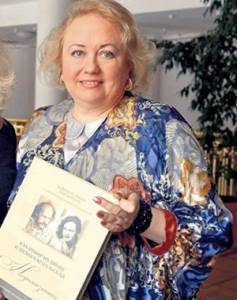
Marina Mulyavina decided not to connect her life with art and creativity, although her mother tried to teach her artistic whistling. In 1979, Vladimir’s eldest daughter got married and gave birth to two sons. Today she is already the grandmother of two grandchildren. Marina's children play guitars, which were inherited from their famous grandfather.
Childhood
Vladimir was born in the city of Sverdlovsk (now Yekaterinburg) on January twelfth, 1941.
Before the revolution, his grandparents were wealthy Siberian merchants with a good education and personal grocery stores. But the Soviet government dispossessed their ancestors, and Vladimir’s father, Georgy Arsenievich Mulyavin, worked in construction as a simple laborer. He had good musical abilities; Georgy played the guitar well. But he left his family and went to another woman.
Mom, Akulina Sergeevna, raised 3 children herself; Vladimir also had a brother, Valery, and a sister, Natasha. They lived in a cramped barracks. Her mother worked in a sewing shop, her small salary was not enough, and in order to feed her family, she always worked somewhere. The children hardly saw her at home; they grew up on their own.
Vladimir's musical talent began to emerge in early childhood, his father's genes affected him. And Georgy Arsenievich himself, even before leaving his family, loved to teach children music. When little Volodya went to the theater to see the opera La Traviata, he walked around for a long time, shocked and delighted by the performance he saw.
At the age of 12, the boy began to master musical instruments and taught himself to play the balalaika and guitar. The music school was paid, and the family did not have extra money, so Mulyavin studied in the children's sector at the Stalin House of Culture with a string orchestra.
Vladimir Mulyavin
The leader of the circle was the former political prisoner Alexander Ivanovich Navrotsky; at one time he graduated from the Institute of Culture in Kharkov and was known as a very talented teacher. With the children, he taught the same program that was taught at the music school; Navrotsky taught them singing, notation, and conducting. The teacher immediately appreciated Mulyavin’s musical talent, only the boy played him the balalaika for the first time. It was here that Volodya disappeared after school lessons and until the evening
Third wife - Svetlana Penkina
A huge contribution to the acquaintance of Mulyavin and Penkina was made by the poet Alexander Mstislavsky, who participated in the filming of the film “Walking Through Torment.”
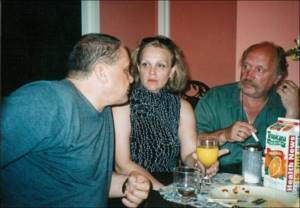
Mulyavin's third wife
Through Svetlana, who played in the film, Alexander conveyed poems for Vladimir Georgievich’s songs. Thanks to this, a relationship began between the musician and the actress.
“There’s a lot that’s unique about her. She is not like other women. She has her own mind, her own opinion,” Vladimir Georgievich said about his relationship with his third wife.
In 1981, the lovers got married, and a year later Svetlana gave Mulyavin a second heir. The baby was named after Vladimir Georgievich’s brother – Valery.
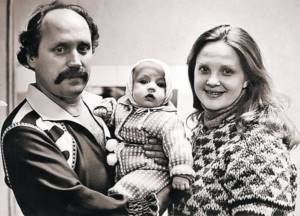
With a third wife and daughter
Many claimed that at the instigation of Penkina, the Pesnyary team broke up. Vladimir always consulted with his wife; she knew about all the affairs of the ensemble. Be that as it may, this marriage became the longest in Mulyavin’s biography.
The beginning of the variety journey
Despite his incomplete musical education, in 1958 Mulyavin was willingly accepted into the regional concert and pop bureau in Tyumen as an instrumentalist. Over the next five years, he had the opportunity to work in the philharmonic societies of many cities: Tomsk, Petrozavodsk, Kemerovo, Orenburg, Chita, Minsk. In his native Sverdlovsk, at the Palace of Culture, he played in the Neapolitan ensemble.
When Vladimir was drafted into the army, he ended up serving near Minsk, where he immediately created a vocal quartet in his company, and then participated in organizing the ensemble of the Belarusian Military District.
After finishing his service, he received an invitation from the Belarusian State Philharmonic to be a guitarist in Yuri Antonov’s band. In nineteen sixty-eight, Vladimir, his brother Valery and 4 other participants created an ak at the Philharmonic, which performed with the singer Nelly Boguslavskaya.
Vladimir Mulyavin
"Pesnyary"
In September nineteen sixty-nine, the Lyavony group received the right to perform their own programs and be called a vocal-instrumental ensemble. Mulyavin was the artistic director of the team.
A year later they went to the All-Union Competition of Variety Artists, but they were advised to change the name. Here they performed for the first time as “Pesnyary” and took 2nd place, which they shared with singer Lev Leshchenko. In the same year, “Pesnyary” won the All-Union Political Song Contest in the capital.
The popularity of the group was crazy.
- one thousand nine hundred and seventy-one - released the first vinyl disc and went abroad to the Polish city of Sopot for the International Song Festival.
- one thousand nine hundred and seventy-three – victory at the All-Union Soviet Song Competition.
- one thousand nine hundred and seventy-six – “Pesnyary” became the first Soviet ensemble to go on tour in America. The next morning the American press wrote: “This group deserved a standing ovation.”
- one thousand nine hundred and seventy-seven – for the active promotion of patriotic songs among young people, the team was awarded the Lenin Komsomol Prize.
- one thousand nine hundred and seventy-nine – all members of the VIA “Pesnyary” were awarded the title of Honored Artists of the Belarusian Soviet Union, and Vladimir Mulyavin was awarded the title of People’s Artist.
Mulyavin never forgot his homeland; the “Pesnyary” were most present in the Urals. But Vladimir also loved Belarus with all his heart; the musician simply adored their folk classic Yanka Kupala. When he felt sad in his soul, he took a volume of the poet’s poems and found answers to his questions in them. Based on the work of Kupala, Mulyavin made a couple of concert programs.
He was very demanding of the members of the group, but otherwise it would not have been possible to create such a unique ensemble, which has no analogues. He was also much more demanding of himself. If the listeners perceived the song he wrote at the 1st concert sluggishly, then Mulyavin immediately tore up the notes and did not remember any more about this work.
What Vladimir never did was perform in restaurants for any money. He explained simply: “I don’t want to perform my songs in front of a chewing audience.”
The star of Mulyavin is laid on the Walk of Fame in the capital. And the President of Belarus Alexander Lukashenko in two thousand and one gave the musician the highest award in the country - the Order of Francis Skaryna.
The vocal and instrumental ensemble “Pesnyary” is recognized as one of the greatest cultural achievements of Belarus of the twentieth century.



